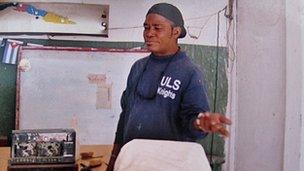Cholera fear in Cuba as officials keep silent
- Published

Uvaldo Pino was a neighbourhood barber in Cerro, one of the poorer and more overcrowded districts of Cuba's capital, Havana.
In late December, the 46-year-old fell sick with vomiting and diarrhoea and died in hospital on 6 January.
The barber's family say he had two separate tests and both came back positive - for cholera.
"We don't know how he was infected," his sister, Yanisey Pino, told the BBC at the family's home, a few blocks from the capital's Revolution Square.
"He was treated, he had all the medicine, but his organs didn't respond. It was too late."
Yanisey added that her brother was a heavy drinker and had checked himself out of hospital the first time he was admitted.
A week after Uvaldo's death, Cuba's health ministry has not yet made any public pronouncement. But there are increasing signs that the barber's case is not an isolated one.
'Dozens' of admissions
Doctors are now making door-to-door enquiries in Havana and anyone displaying possible cholera symptoms is being tested. Suspected cases are being sent to the Tropical Medicine Institute, the IPK.
"All our wards are dealing with this issue - they are almost full," an IPK employee told the BBC by telephone, before saying she was not authorised to comment further.
Another staff member, contacted later and also not authorised to speak to the media, said the IPK did not have any confirmed cases of cholera at this point.
But Yanisey Pino says her brother was diagnosed with cholera both by his local hospital and the IPK.
The day Uvaldo died, health workers visited the family where they live - in several cramped houses around a small yard. Relatives and neighbours were issued antibiotics as a precaution.
The area has been disinfected and water samples were taken for testing. Meanwhile, nearby bars and cafeterias have been closed or instructed not to sell food or drink that is not pre-packed.
Elsewhere in the neighbourhood, there are similar scenes.
One resident, Yudermis, fell sick just before the New Year, along with four other relatives including her seven-year-old son. The family assumed they had food poisoning but Yudermis says her cousin then tested positive for cholera at their local clinic.
"The health workers then came here asking questions, like if we had diarrhoea," she explains inside their rundown family home as her son, now fully recovered, plays nearby.
"They sent us all to hospital by ambulance and the tests came back positive.
"There were a lot of people at the IPK," Yudermis adds, describing dozens of admissions while she was being treated, and not all from her own district of Cerro.
"I was in a bad way. It was frightening. But we're fine now."
Before she fell sick, Yudermis had never even heard of cholera, which is rare in Cuba.
Cold grills
The World Health Organisation (WHO) describes cholera as "extremely virulent". Carried by contaminated water or food, it causes severe dehydration through diarrhoea and can prove fatal if untreated.
Until last summer, there had been no significant outbreak on the island since well before the revolution.
But in July the health ministry confirmed that three people had died of cholera in the east of the country. A contaminated well was identified as the source.
In Havana, Cuba's bustling and crowded capital and a key tourist centre, strict measures are in place to contain the latest suspected outbreak.
"We can't sell anything that's not in sealed bottles until further notice and all food sales have been suspended," explains Tony, at the Cerro Moderno cafe, a short walk from the home of Yudermis. Its fridge is now empty and the grills cold.
Local doctors confirmed this is standard procedure for several blocks around every location where someone tests positive for cholera.
"If they take all the right measures, we'll be fine," Tony shrugs, adding that everyone has been given antibiotics as a precaution.
"I took my pills straight away!" says Angel, as he buys cigarettes at the cafe.
"I don't know what cholera is and I don't want to find out. People here are using chlorine and boiling their water. You have to take care."
Rumour mill
Pharmacies across the city are now selling water purification drops, rationed to two small bottles per person.
But in the tourist heart of Old Havana, cafes and restaurants remain open and the streets are still full of mobile food and drink vendors.
Most say they have heard rumours of a cholera outbreak in Cerro and are taking extra precautions, but none have received any official instructions.
The WHO stresses "public communication" as a key tool in controlling any cholera outbreak.
In Havana, that task has so far been left to local doctors who are very connected to their communities.
But as rumours fill the information void, concern on the streets is growing.
"I'm racking my brains trying to understand why there's nothing on TV about this," says Yanisey Pino, echoing many peoples' comments.
"Why don't they say something? Inform people, like in other countries, so they're not afraid and can protect themselves! But there's no information at all."